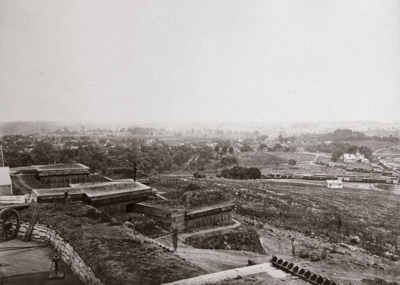On Saturday I went over to Fort Negley for the unveiling of the Descendants of Fort Negley Project. It was fantastic. The room was so crowded they had to add more chairs twice. The folks involved talked about what they were up to — they’d like to find and document the families of people who either served at or worked at Fort Negley. They showed two videos of descendants to give us a look at what they’re trying to do.
But it got me thinking — do people know how to find out if their ancestors were at Fort Negley? One of the descendants, Gary Burke, had been a Civil War reenactor for years before he found out about his personal connection to the fort. Dr. Eleanor Fleming found out that her ancestors were at Fort Negley because she saw their names in the list of workers tweeted out by the Fort Negley Twitter account last fall.
So, how can you find out if your ancestors were at Fort Negley? First of all, let’s acknowledge that it can be very difficult to find out information about your African-American ancestors. But it’s not impossible. Start with building a family tree of people you know. Then you might also keep a fantasy family tree full of the information your family thinks or heard. Like, for instance, my dad had heard that there was an Abraham Lincoln Phillips and a George Washington Phillips somewhere in the family. I found George Washington eventually. He wasn’t a Phillips, but he was the relative of a woman who had married a Phillips. A lot of times old stories have a kernel of truth that has just gotten twisted in misunderstanding over the years.
Then you can start using census records and old city directories to help nail down who was related to whom and how. If you don’t have or don’t want a subscription to a site like Ancestry.com, your local library may have a subscription. And both the downtown library and the Tennessee State Library and Archives have old city directories.
Once you know what names to look for, Fort Negley has the names of the workers and the records for the United States Colored Troops are available online, through the National Archives and through places like Ancestry.
Just speaking broadly — and certainly there are exceptions to this rule — the farther back you go in history, the harder it was for black Southerners to move around. So, if your grandmother grew up here in the 50s, her parents might have come from rural Rutherford County or up from Birmingham or wherever. But if her grandmother was here in Nashville in the 20s, the likelihood that your family was here right after the Civil War is much, much greater.
If your family is from Davidson County and has been as far back as you know and they live or lived in the black communities surrounding Fort Negley, it’s very possible that someone in your family worked on Fort Negley.
So, those are the questions to ask yourself: Is my family from Davidson County as far back as I know? Did my family live near Fort Negley? Can I find family names from that era I can compare to the list of names of people we know were there?
And the folks at Fort Negley can help. The folks at the TSLA can help. The downtown library has great resources. Taneya Koonce and the Afro-American Historical and Genealogical Society are super helpful and kind people who can help you figure out how to approach the task.
It’s a deep but often unacknowledged kind of violence to cut people off from their families — to deny people knowledge of their ancestors, to deny people descendants to remember them. But now there are people looking to help mend these broken connections.
Even if you have looked before and found nothing, it’s worth looking again.





